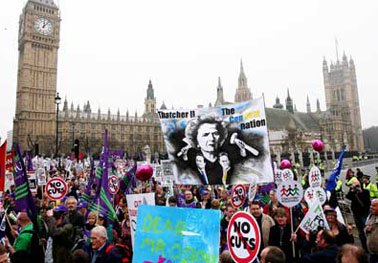Would Harper majority government in Canada be like Cameron-Clegg coalition government in UK?
Mar 29th, 2011 | By Citizen X | Category: In Brief
Lawrence Martin, Ottawa pundit and author, asks: “Stephen Harper never used to talk about a majority. Now he’s practically begging for one. Can he win it?” And he answers: “Yes ... How? Smoke and mirrors. The creation of a fictional universe.”
[UPDATED MAY 3]. There was a time when people interested in politics in at least English-speaking Canada also paid attention to politics in the United Kingdom (which used to be better covered in Canadian newspapers than it is today). And in the back-to-the-future 21st century age of Stephen Harper there are a few reasons why reviving something of this custom might make some transitory sense.
On the same day PM Harper was going to visit the Governor General in Ottawa, eg, to arrange the May 2, 2011 Canadian federal election, “up to 500,000” people descended upon the old imperial metropolis of London, to protest “against the UK government’s cuts in public spending.” And all this might make you wonder whether the “harsh austerity measures” that have been introduced by David Cameron and Nick Clegg’s Conservative-Liberal Democrat coalition government in the UK are the real model for the “Smoke, mirrors and a Harper majority” government now being so recklessly sought by the Conservative Party of Canada?
So far, to garner support from the opposition majority in Parliament, the Harper minority governments bequeathed by the 2006 and 2008 elections have borrowed heavily from the Jean Chretien and Paul Martin Liberals for their broad economic policy. If anything, they have been somewhat less faithful than their late 20th century Liberal teachers to what US economic advisor Carl Weinberg has called “the conservative approach to the public finances that Canada has established since 1993.” But the “Canada’s Economic Action Plan” that the Harper Conservatives are still bragging about – “a comprehensive budget plan to stimulate economic growth” – is a near textbook case of Keynesian liberalism (and Liberalism) at work in the northern North American wilderness.
You don’t even have to read between the lines of the lame-duck Harper Government budget introduced last Tuesday, however, to appreciate that the so-called “Next Phase of Canada’s Economic Action Plan” is meant to be something quite different. (And this could prove especially true if minority PM Harper manages to win his much coveted majority of seats in the Canadian House of Common this coming May 2 – with the support of considerably less than the majority of actual live Canadians, down on the ground.)
Health care and tax policy : two Achilles’ heels of a Harper majority …

The protest against very aggressive public spending cuts in the UK this past Saturday, March 26, said by some to be the biggest in “London's post-war history,” also inevitably attracted some masked anarchist troublemakers – a bit like the G8/G20 protests in Toronto last summer.
Thomas Walkom at the Toronto Star is particularly concerned about just what a free-at-last right-wing Harper majority government might try to do with Canada’s present publicly funded health care system. It’s “the Conservative approach to medicare that seems to worry Canadians most,” Walkom writes in his latest column: “At one point, Harper himself urged Alberta to pull out of national medicare,” although in “recent years, Harper has tried to assuage fears about his approach to Canada’s premier social program.”
Walkom goes on: “But with medicare, the devil is in the details. If Ottawa cuts to the bone its cash funding of provincial health care, the Canada Health Act will become meaningless and national medicare itself an empty shell … Would a majority Conservative government do this? We don’t know.” The denizens of Harperland have been “silent on what they would do when the current federal-provincial medicare funding arrangement expires in three years … In last week’s budget, the Conservatives pledged to cut $17 billion more in government spending over the next five years. They very carefully didn’t say where these cuts would be made.”

These March 26 demonstrators in London apparently do support increasing taxes – for some people at any rate.
Personally, I am even more concerned about a Harper majority government’s approach to tax policy. There is no question that virtually all western (and other) governments in the global village today have growing deficit problems – in the wake of economic stimulus and other measures induced by the fall 2008 global financial panic (and a too-long history of still other measures, a quarter-century before that). This is exactly what prompted no less an authority than David Stockman, former director of the Office of Management and Budget for Ronald Reagan in the USA, to urge, way back in February 2010: “I think the lesson of the last 25 years is that it doesn’t work …Â Taxes are going to have to be raised … The Republicans think their mission in life is to cut taxes. Sorry … game over. We’re now in the tax-raising business. And we’re going to be in the tax-raising business for the next decade.”
Like the current mainstream of US Republicans (Stockman himself was what would now be a rare non-mainstream Republican Congressman from Michigan, 1977—1981), Stephen Harper’s Conservatives in Canada are still mindlessly wedded to the knee-jerk ideological fantasy that tax cuts are the ultimate best solution to virtually all economic problems. Their lame-duck 2011 budget proposed carrying on with a pre-2008 scheme of continuing corporate tax cuts, that all other parties in the Canadian House of Commons rejected as unnecessary and unwise at the present juncture. The budget’s title – “The Next Phase of Canada’s Economic Action Plan: A Low-Tax Plan for Jobs and Growth” – itself signals the Harper Government’s continuing commitment to the kind of thinking that David Stockman, with considerably more economic experience and intellectual honesty (and private sector success), says just “doesn’t work.”
It’s the quality not the size of government that matters …

A plaque targeting Prime Minister David Cameron, as demonstrators protest in Oxford Street, London, 26 March 2011.
Probably the most crucial problem with all the low-tax rhetoric that has invaded so much public policy thinking since the late 1970s and early 1980s is that if we are not going to raise taxes in our current economic environment (and without a doubt this is not a popular policy these days), the only way to deal with growing government deficits is to very aggressively slash public spending. This is (even with some tax increases) what the Cameron-Clegg government is doing in the United Kingdom right now. And it is not only promoting increasingly abrasive public protests. It is very clearly NOT improving the British economy either. (See, eg: “British Pound Depreciates Against Dollar as UK Business Confidence Falls” and “England’s Slowing Economy Could Lead To Downgrade: Moody’s.”)
Those right-wing ideologues who are virtually immune to contrary empirical evidence will just say the policy needs more time – a little more short-term pain for long-term gain and all that. And yet what is so frustrating about so much current policy debate on this front is that the experience of the global village since the Second World War actually suggests something quite different. To take just an incidental “Economy Lab” item from today’s Globe and Mail in the largest Canadian financial centre (and now apparently the 10th largest in the world):

Demonstrators march past Parliament Square in London to protest against Government spending cuts Saturday March 26, 2011.
“An unspoken assumption behind many calls for smaller governments with lower taxes and lower levels of spending is that this policy recipe will encourage economic growth. However, the theory behind that conclusion is at best murky, nor is there much in the way of evidence to support it. In his survey of the empirical literature on the factors associated with economic growth, Columbia University economist Xavier Sala-i-Martin observes that, ‘The size of the government does not appear to matter much. What is important is the ‘quality of government’ (governments that produce hyperinflations, distortions in foreign exchange markets, extreme deficits, inefficient bureaucracies, etc., are governments that are detrimental to an economy).’”
This also reminds me of something that Ontario finance minister Dwight Duncan has just declared in today’s Ontario provincial budget (the crucial strategy behind which has been aptly summarized in the press as “Deficit reduction with a heart”). It is short and to-the-point – and it also nicely summarizes what strikes me as another key aspect of Columbia University economist Xavier Sala-i-Martin’s observation that what matters is not the size of government, but its quality:Â “Our government” (Mr. Duncan intoned early on in his budget speech this afternoon) “believes that strong public services are essential to a strong economy.”
This kind of belief too has been an important ingredient in the (no doubt essentially and responsibly “conservative” in a small-c sense) approach to public finance that the Chretien and Martin Liberals reintroduced into Canadian public finance back in the earlier 1990s – and that has served us so well since then.
What concerns me most about a Harper Conservative majority government over the next four years is that, undisciplined by a more sensible opposition majority, it will throw Canada’s future into at least something a bit too much like the over-aggressive public spending cuts that the Conservative-Liberal Democrat coalition has implemented in the United Kingdom – and that the current Republican majority in the House of Representatives wants to introduce in the United States. To me a California high school economics teacher recently summarized the real history best: “Let’s be clear. It was the Republicans who wrecked the economy. Both their people and their policies drove the economy into the ditch. They wrecked the economy not once, but twice in the last eighty years … So Republicans condescending to instruct Americans about how to fix the economy is like the captain of the Titanic lecturing shipping operators about safe procedures for navigating the north Atlantic. No sane society would tolerate it. But this one does.” (And Mr. Harper with a majority government at last may just still be a bit too eager to lead some wild adventure beyond our own current sane society, up here in the true north, strong and free.)
UPDATE MAY 3: Well it’s all over today! See the counterweights editors on “A historic unnecessary election .. probably .. and now there’s only one party responsible for the next four years” … (We’ll just have to wait and see what the “Harper Government” does with a majority of seats in the Canadian House of Commons at last!)



I should note the Liberal Democrats are generally philosophically aligned with the Liberals in Canada, not the Tories. While the cuts are deep, Britain’s situation is far more dire than Canada. I should note they did raise taxes, but the problem is that Britain is an EU member and if their taxes are too high capital will just go elsewhere as the EU prohibits all restrictions on capital movement within the EU. Even Greece which has a centre-left government is making big cuts, while Germany with a centre-right one is not thus it seems in Europe it seems the size of the cuts are more based on how bad the deficit it. The tea partiers in the United States are a whole different thing as they only favour cuts on “left wing programs” not right wing ones. Britain is cutting military spending whereas the Republicans would never touch this. As for what Harper would do, I leave that for others to judge although even if he does cut dramatically, most of the unpopular cuts would be reversed once the Tories get turfed while the popular ones would stay in place.
It’s true that the economic backgrounds in Canada, the UK, and the US are not identical. But it is the Conservatives in the UK who are leading the current coalition, and many Liberal-Democrat supporters are saying their party has been duped. (The recent German elections seem interesting too, but that’s a bit different again I suppose.) I’d say Citizen X is onto something here, and to me there are two big concerns. The first is that by stridently ignoring the advice of David Stockman and others like him about raising taxes in any degree, a Conservative majority govt in Canada would just make it that much harder to deal effectively with our deficit and debt issues. And the second is that by dramatically cutting public spending it will just seriously derail the “fragile” economy recovery already in motion, supposedly — regardless of what may happen further down the road “once the Tories get turfed.” The big trouble with the hard-right tax-cutting and small government approach to our current economic problems is that experience has shown — again and again — that it just doesn’t work. Of course a Harper majority government might not really move in this direction. But there actually is more than a little evidence to suggest it just might. And my own view would be why take the risk?
[…] Would Harper majority government in Canada be similar to Cameron-Clegg … […]